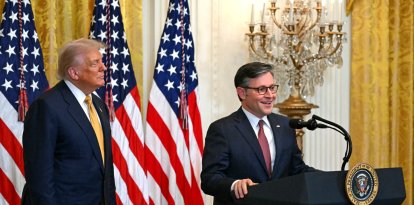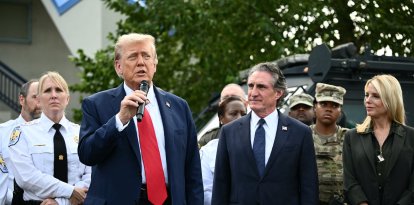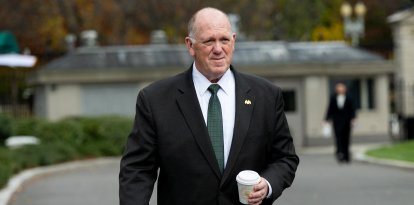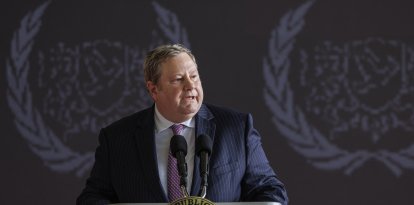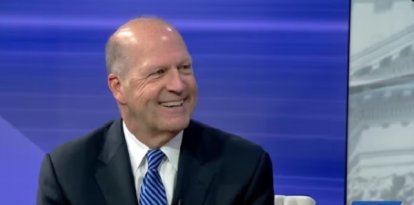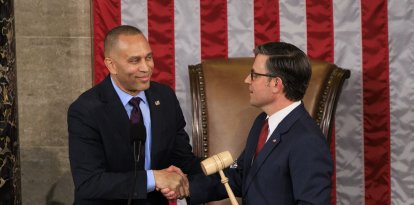Report reveals Pelosi's responsibility for security failures on Jan. 6
A document from Republican representatives singles out the Speaker of the House for putting political pressure on the head of Capitol security and withholding information from GOP members.

Report reveals Pelosi's responsibility for security failures on Jan. 6
A report by congressional Republicans has revealed that House Speaker Nancy Pelosi played a key role in the disastrous security and information management of Capitol Intelligence during the January 6, 2021 assault. The document contains evidence of the veteran Democrat's partisan lobbying of the institution's sergeant at arms as well as the exclusion of conservative representatives from key meetings and the withholding of data from GOP members.
https://www.scribd.com/document/615867016/FINAL-Report-of-Investigation-January-6
"Leadership and law enforcement failures within the U.S. Capitol left the complex vulnerable on January 6, 2021," the report concludes. For the write-up, five Republican representatives collected text and email messages, as well as testimony from leaders and rank-and-file Capitol Police officers. In the document, it is pointed out that one of the main members accused of the security disaster on that day, the sergeant at arms of the Chamber, Paul Irving -who lost his position after the incidents- "succumbed to political pressure from Speaker Pelosi's office and HouseDemocratic leadership" and he was "compromised by politics and did not adequately prepare for violence at the Capitol."
"Political pressures"
The brief emphasizes that Irving was required to obey Pelosi by following the chain of command, since he answered to her as one of the three voting members of the Capitol Police Board. In fact, after his dismissal, he received several e-mails describing his departure as unfair and pointing to instructions and pressure from the president of the chamber as the real reason for the disaster. For example, an email from an anonymous worker criticized Pelosi's "knee-jerk reaction to yesterday's unprecedented event" and called his resignation "spectacularly unfair, inequitable and unjustified." It is not your fault. Nor [Capitol Police Chief Steven] Sund's fault."
The authors of the report charge that Republican representatives were deliberately excluded from "important security-related discussions" while Pelosi and her staff "closely coordinated" with Irving on security plans for the Jan. 6 Joint Session of Congress. In fact, the report reflects the moves that participants in these meetings made to keep their rivals in the dark. For example, Irving himself went so far as to direct a veteran Democratic staffer to "act surprised" when he sent "key information about plans for the January 6, 2021 Joint Session to him and his Republican counterpart."
Obsession with avoiding another Black Lives Matter
In addition, the report charges that the National Guard could not be deployed in time because of a political decision by Pelosi and "widespread concern among Democratic leaders about 'optics' in the wake of the summer 2020 Black Lives Matter protests." Capitol Police Chief Sund himself has noted that he personally called for troops several times prior to Jan. 6, but Irving rejected his demands out of concern for "optics." In fact, on the same day of the events, Sund repeated his request, but the aid was delayed until after the riots were over, because Irving needed to get it up the chain of command, i.e., to Pelosi.
The document refutes Pelosi's claims that she "has no power over the Capitol Police," stressing that "The Rules of the House dictate that the Sergeant at Arms must report directly to the Speaker of the House." In fact, "documents provided by the [actual] House Sergeant at Arms show how then House Sergeant at Arms Paul Irving carried out his duties in clear deference to the Speaker, her staff and other Democratic staff."
Mistakes made by the intelligence services
To bolster their assertion, the authors echo other occasions when the Speaker did exercise her security authority, such as "when she ordered the use of magnetometers outside the House of Representatives in the name of security. Similarly, she demanded masks in the House of Representatives [and] exerted influence on Capitol Hill security protocols related to the perimeter fence. She also supervised the fence that was erected for a supposed rally on September 18, 2021, which never materialized."
The Intelligence Division of the Capitol Police deserves a separate chapter. According to the brief, it "failed to warn USCP leadership and line officers about the threat of violence." despite having "obtained sufficient information from an array of channels to anticipate and prepare for the violence." What happened in this regard is even more surreal in fact: An intelligence report three days before the riots did warn of a possible violent scenario in which "Congress itself" could be attacked by armed Trump supporters. But the warning was buried at the end of the 15-page text, outside the initial summary, so it was overlooked.
Unfortunate decisions
Within the intelligence failures, Republicans point directly to USCP intelligence division deputy director Julie Farnam, who had traded the Department of Homeland Security for Capitol Hill just 10 months earlier. According to analysts, "the section became ‘nonfunctional’ immediately upon Farnam’s arrival as she tried to 'consolidate power for herself to the detriment of the safety and security of the Capitol.'"
The report includes documents and testimonies that show that Farnam "began to dismantle the systems that had kept the Capitol secure for so long" as soon as she arrived and without knowing how they worked or the teams she was in charge of. Moreover, her decisions during the incubation period of the riots and during the outbreak of the riots were unfortunate, according to statements by agents under her command.
"Strictly reactive"
"Information about planned protests and threats of violence were siloed and not properly analyzed or disseminated during this key period because of Farnam’s misplaced priorities," according to the report. An intelligence analyst denounced that "at the time of Jan. 6 we were not doing proactive searches on social media like we had been before. We were strictly reactive.
The report dismantles the version that Pelosi herself wanted to give about her supposedly heroic performance through a video published a few months ago in which the Speaker of the House was followed during the assault. In the recording, which showed Pelosi leading, organizing and reassuring everyone in the Capitol, the veteran Democrat acknowledged her desire to "punch Donald Trump in the face."
"Partisanship, incompetence and indifference"
The authors of the document are Republican Representatives Jim Banks, Jim Jordan, Rodney Davis, Kelly Armstrong and Troy Nehls. In fact, they were the five congressmen originally nominated to serve on the committee on January 6, but Pelosi vetoed Banks and Jordan. House Minority Leader Kevin McCarthy recalled the rest in protest and Pelosi then took the opportunity to put in Liz Cheney and Adam Kinzinger, two anti-Trump Republicans.
Banks himself exposed to Just The News his conclusions: "Our report exposes the partisanship, incompetence and indifference that led to the disaster on January 6 and it the leading role Speaker Pelosi and her office played in the security failure at the Capitol." The Republican representative did not hesitate to charge the Jan. 6 committee, which he called a "sham": "Unlike the sham January 6th Committee, House Republicans produced a useful report that will keep our Capitol and USCP officers safe with no subpoena power and no budget."














